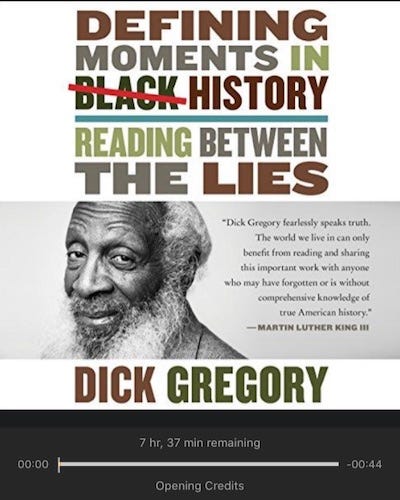Defining Moments in Black History: Reading Between the Lies by Dick Gregory
2020, book 11: “Anytime you accept injustice, you become unjust. Anytime you peacefully coexist with filth, you become filthy.” — Dick Gregory

Finished on February 20, 2020
I wanted to study this book and strive to learn as much as I could from it. I knew that this book was going to be educational and incredibly dense and was looking forward to that. This book definitely did not disappoint. I learned a great deal about history and was incredibly impressed by the way that the author presented everything.
Have you ever had an experience where you were stuck? Where you were working and pushing and striving for great levels of positive impact but then faced the consequences of the resistance that you inpsired or led? Dick did. I have never been in jail. I’ve known a number of people who have spent time behind bars and some are my great friends. There have been other occasions where I’ve helped out a friend whose cousin’s husband ended up in jail — without documentation. I can only imagine and strive to empathize but in my limited understanding, I can reasonably conclude that none of the experiences in jail are particularly pleasant. Point being for the author? If you are working and pushing for somehting that is different from the status quo, there is a great chance that you will face consequences more severe than you believe that there should be.
The author shared that he’s spent time in jail. “Anybody trying to change the country for the better or just by being a black man on a sunny day is usually arrested.” He spent time in jail on 9 counts for 9 months total for protesting. He was placed in a private room and took the bottom bunk so he could read hands-free. He shared that he meditated for a long while.
This was an enormous number of people that migrated. In terms of economic impact, this is huge — especially at that time. Are these big three things that have gone away today? 100 years later? Not particularly. One person that I enjoy following now is Boyce Watkins
Between 1910 and 1920 alone, over 500,000 blacks migrated from the south to the north and west. The author shared that though things were much better there than in South Carolina or other southern states, blacks still had to face the big 3: segregation, discrimination, and poverty.
I loved his focus. He hit the facts. Hard. Then he related all of the previous major events throughout our past with present day. Just imagine the impact if this was a 100% boycott. The impact would far exceed any type of protest. Action always wins.
The author reiterated how the Montgomery bus boycott went on for 381 days. He then shared that to create real change one way to do it would be to boycott the retail stores for 1 month just Thanksgiving through Christmas.
Ridiculous. It’s horrible to see what people will do just to silence some voices. Throughout 2020, we saw this time and time again. There are so many “talking heads” that strive to mitigate rather than solve what people are getting attention for and truly striving to change.
The author shared something that JFK said after cutting off food stamps in Mississippi. Kennedy was quoted as saying, “Give them food stamps again, that Dick Gregory is getting too much attention.”
Wild. And during an election year, I was a little more attuned to these sorts of things than I might have been otherwise. The voting acts that were pushed through were impactful, to say the least, but what is their lasting impact?
Lyndon Johnson became President after the JFK assassination. He pushed the voting rights act through congress soon after Bloody Sunday.
The parts of the act:
Section 2 makes it so that no states can pass any laws resulting in racial discrimination.
Section 5 makes it so nobody can make any changes that affect voting without first going through the US Attorney General or the US District Court for the District of Columbia.
Section 4b protected voters against the southern states which were their worst enemies in the 1960s.
The US Supreme Court ruled in 2013 in Shelby County vs. Holder that Section 4b wasn’t needed because things today are not like they were in the 1960s. The author emphasized that Section 5 without Section 4b is like a car without wheels. It’s still a car but it can’t do the main thing you need it to.
It’s a lose lose situation, right? Only if there is not any type of lasting change. As the saying goes,
“First they ignore you. Then they ridicule you. And then they attack you and want to burn you. And then they build monuments to you.” — Ghandi
I’d say that the saying above very much applies here. Whenever someone sets out to change something that has been the status quo and has been broadly accepted, there will be dramatic resistance and often incredible stubbornness as a result — maybe even violence to maintain the status quo that was and still is in the present day. Unjust or filthy? Only one is true, the other is just a perspective that you don’t have to share — just because someone thinks that you are filthy does not mean that you are. When what is now the United States first wanted to break from England, don’t you think that everyone perceived them as filthy? And now? Some still might, but that doesn’t mean that filthy is what they were.
“Anytime you accept injustice, you become unjust. Anytime you peacefully coexist with filth, you become filthy.” — Dick Gregory
I gave this book a 4.5/5
Join my weekly newsletter to see all of my writing here.